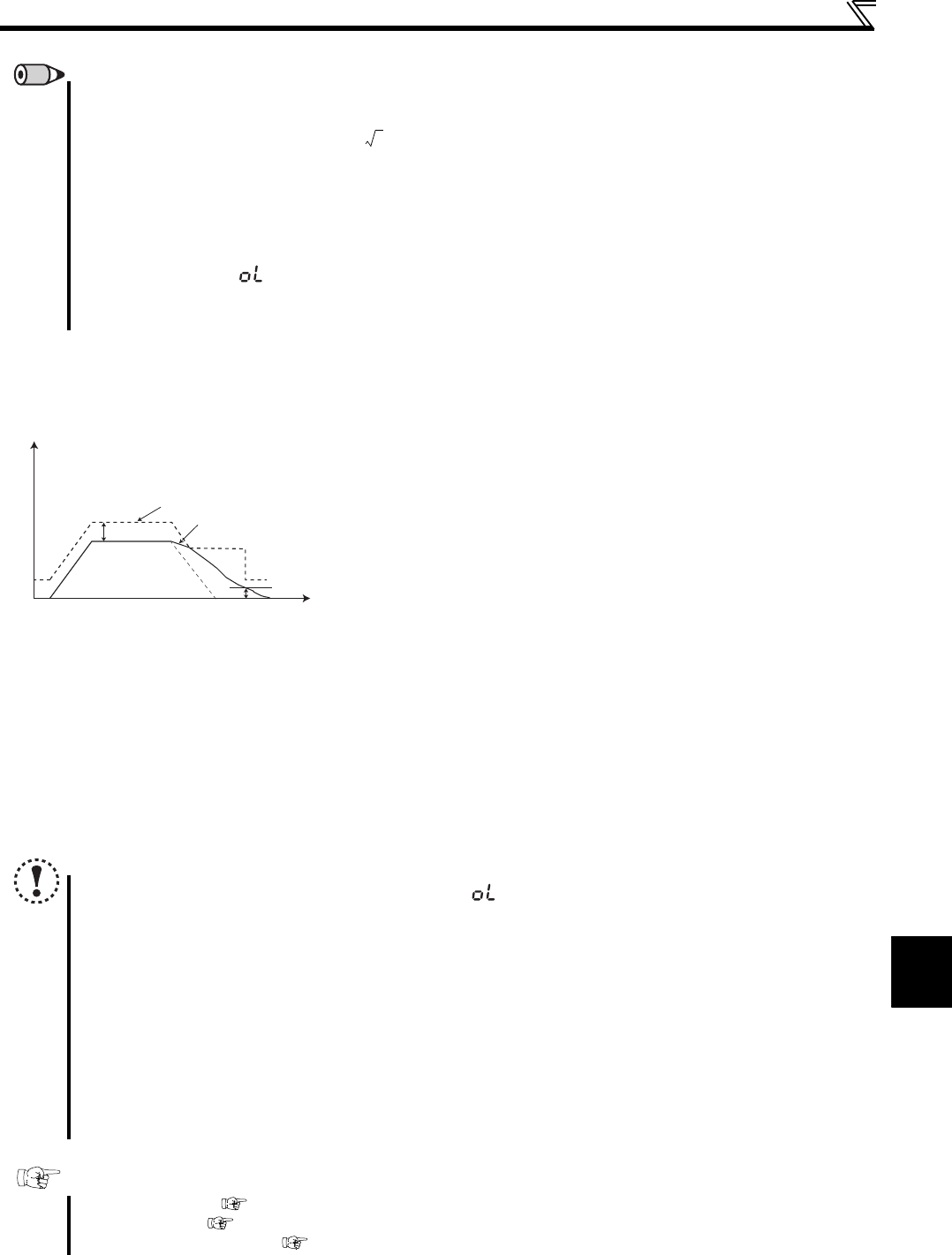
175
PARAMETERS
5
Special operation and frequency control
(3) Regeneration avoidance function adjustment (Pr. 665, Pr. 886)
If the frequency becomes instable during regeneration avoidance operation, decrease the setting of Pr. 886 Regeneration
avoidance voltage gain. Reversely, if sudden regeneration causes an overvoltage alarm, increase the setting.
When vibration is not suppressed by decreasing the Pr. 886 setting, set a smaller value in Pr. 665 Regeneration avoidance
frequency gain.
REMARKS
The acceleration/deceleration ramp while the regeneration avoidance function is operating changes depending on the
regeneration load.
The DC bus voltage of the inverter is about times as input voltage.
When the input voltage is 220VAC, bus voltage is approximately 311VDC.
When the input voltage is 440VAC, bus voltage is approximately 622VDC.
However, it varies with the input power supply waveform.
The Pr. 883 setting should be kept higher than the DC bus voltage level. Otherwise, the regeneration avoidance function is
always on even in the non-regeneration status and the frequency increases.
While overvoltage stall ( ) is activated only during deceleration and stops the output frequency, the regeneration avoidance
function is always on (Pr. 882 = 1) or activated only during a constant speed (Pr. 882 = 2) and increases the frequency according
to the regeneration amount.
(2) Limit regeneration avoidance operation frequency (Pr. 885)
You can limit the output frequency compensated for (increased) by the
regeneration avoidance function.
The frequency is limited to the output frequency (frequency prior to
regeneration avoidance operation) + Pr. 885 Regeneration avoidance
compensation frequency limit value during acceleration or constant speed.
If the frequency increased by regeneration avoidance function exceeds
the limit value during deceleration, the limit value is held until the output
frequency falls to 1/2 of Pr. 885.
When the frequency increased by regeneration avoidance function has
reached Pr. 1 Maximum frequency, it is limited to the maximum frequency.
When Pr. 885 is set to "9999", regeneration avoidance function operation
frequency setting is invalid.
NOTE
When regeneration avoidance operation is performed, (overvoltage stall) is displayed and the OL signal is
output. Set the operation pattern at an OL signal output using Pr. 156 Stall prevention operation selection. Set the output
timing of the OL signal using Pr. 157 OL signal output timer.
When regeneration avoidance operation is performed, stall prevention is also activated.
The regeneration avoidance function cannot shorten the actual deceleration time taken to stop the motor. The actual
deceleration time depends on the regeneration energy consumption capability. When shortening the deceleration
time, consider using the regeneration unit (FR-BU2) and brake resistor (MRS type, MYS type and FR-ABR etc.,) to
consume regeneration energy at constant speed.
When using the regeneration unit (FR-BU2) and brake resistor (MRS type, MYS type, FR-ABR etc.), set Pr. 882 to "0
(initial value)" (regeneration avoidance function invalid). When using the regeneration unit, etc. to consume
regeneration energy at deceleration, set Pr. 882 to "2" (regeneration avoidance function valid only at a constant
speed).
Parameters referred to
Pr. 1 Maximum frequency Refer to page 105
Pr. 8 Deceleration time
Refer to page 116
Pr. 22 Stall prevention operation level Refer to page 101
2
Limit level
Time
Pr. 885
Output frequency (Hz)
Output frequency (Hz)
Pr. 885/2


















